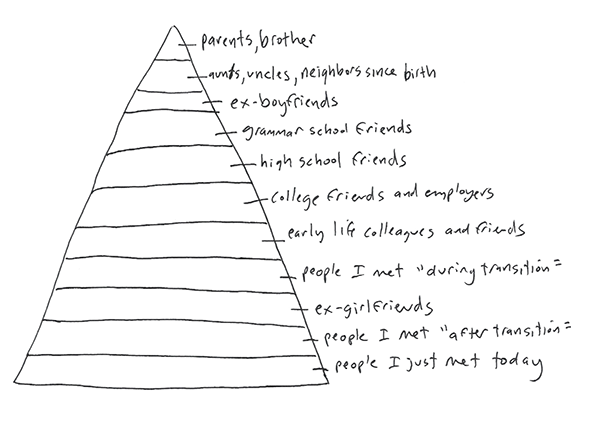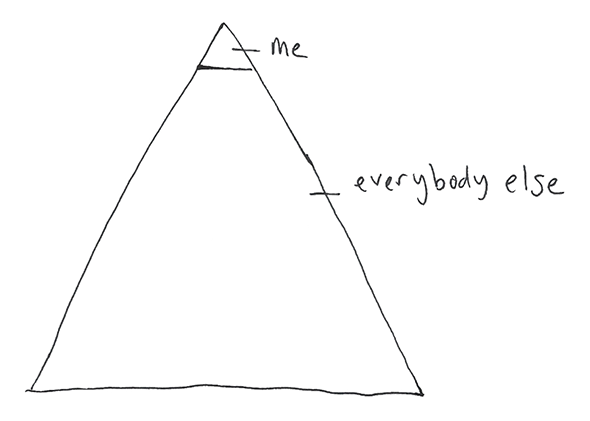The following is an excerpt from Real Man Adventures, by T Cooper, out now from McSweeney’s Books.
What’s the first thing people ask when a woman is going to have a baby?
Is it a boy or a girl?
Sure, the halfhearted Is it healthy? question is usually soon to follow for good measure and/or manners, but mostly folks want to know what the sex of the baby is. Or they don’t want to know what the sex of the baby is. All about the sex: We told the doctor not to tell us! We wanted to be surprised! Well, I’m here to tell you that gender surprises can happen any time. Just ask my parents.
A few years back, if I had to draw a pyramid to represent who has it “hardest” with respect to the subject of me and pronouns (with “most difficult” on top and “not really difficult at all” on the bottom), it would look something like this:

T Cooper
Notice that I am nowhere on the pyramid. This is because for many years, I was generally apologetic about my situation. I didn’t want to make anybody feel uncomfortable, ever, so I readily shelved my own discomfort over being referred to by the wrong pronoun. In my early twenties, I had been in a boy band (so being a guy was all just in the name of satirical performance!). And for years after that, I minced around my preference about gender pronouns in real life, splitting the difference, perhaps to make it less jarring for people, asking for no gender pronoun to be used in reference to myself. But that got tricky: “T said T wanted to stop by T’s house before we go to bingo.”
Closer friends naturally transitioned into calling me “he,” which felt best, but when other people messed it up, I was always like, “Whatever! You can even call me ‘Asshole ’ if you’d like—I’m sure it’s gotta be really hard for you!” As for my parents, I remember saying to them one time early on, “You don’t have to call me ‘he’ if you can’t bring yourself to, but please try not to use ‘she.’ ”
But now I wished I hadn’t said any of that. That I’d never spent so much time at that stage. And if I were to draw that pyramid now—again, with easiest on the bottom and hardest at the top—this is what it would look like (most days):

T Cooper
Once I overtly switched to “he” and let people in my life know about it (still in a self-mocking way that let everybody off the hook), that’s when I got off the apologetic train. After fielding scores of “It’s so hard, because I’ve always known you as ‘she,’ ” and “I know it’s no big deal for you, but it’s really hard for me,” I stopped being so goddam accommodating and started gently correcting people, even if it made them mildly uncomfortable in the moment. Because you know what’s mildly uncomfortable? Not being seen for who you are, especially by people who are supposed to know and love you. You know what else? People insisting you are something you are not, and likely never have been.
I’m sorry, but I don’t understand what’s so f***ing hard about calling me what I am, what I prefer. If you are introduced to somebody as John, it’s not cool to decide to call him Sally, or even David, instead (simply because you choose to, or worse, because you woefully—for John—happen to have knowledge about his past using a different name). Or say you have a good friend you’ve known for years. You used to go out to bars with this guy, snort drugs, hook up with strippers, and then wake up and do it all over again the next night. If this guy is now five years sober and happily married with two-point-five perfect children, you probably wouldn’t call him up every day and ask him to score some coke and go whoring with you. (Especially not if his wife answers the phone.) It’s not the world he lives in, even if you think or wish it still is. Maybe it never was him, it never quite fit, and he had to wade through all that crap in order to reach the happy puppies-and-rainbows-filled place he is today.
Or say you always played basketball with a different buddy, that’s all you guys did together—played on your high school team, at the Y, down on the corner, at Chelsea Piers in one of those oppressive adult leagues where everybody has to buy the uniform and celebrate at the sponsoring Irish pub after all the games. But then your buddy is in a gruesome Staten Island Ferry accident, leaving him paralyzed from the waist down, exiled permanently to a wheelchair. Would you forevermore go up to him, see him sitting in that wheelchair, and then be like, “Yo, you wanna go down to the corner and play some pickup? Ooops! I didn’t mean to say that! Sorry, it’s just so hard to get used to!”
No, it’s f***ing not. You know who it’s hard for? The dude who never gets to walk again, never gets to play pickup hoops with his buddies again, never gets to use his dick again for anything outside of involuntarily urinating into a bag. That’s who it’s hard for.
All these not-quite-right analogies are just a fairly shrill way of saying that it always makes me feel like shit inside when people refer to me as “she.” It doesn’t happen much anymore (outside family and a few old friends—or the random schmohawk who is introduced to me and naturally takes me for what I look like and what I am, a guy, but then hears from somebody that I’m trans, or does some Googling and figures it out on her own). And it doesn’t matter if it’s with the best of intentions, or whether it’s obvious to those in ear-shot that I am male and nothing’s technically been lost, that there’s obviously been a mistake. Or even if they are talking about the past.
Excerpted from Real Man Adventures, by T Cooper, published by McSweeney’s Books, 2013.